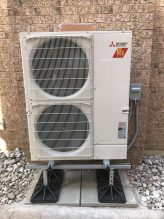Save money and our environment by switching to eco-friendly home appliances
Environment | September 11, 2023
Did you know that the appliances in your home can significantly impact our environment? Many of our household appliances, like refrigerators, washers and dryers, can use more energy than needed. If you want to replace one of your appliances, consider switching to an energy-efficient appliance. They’re great for the environment and can help reduce greenhouse gas emissions, energy consumption and water usage in our homes while cutting energy bills in the long run.
Energy efficiency appliances use less energy, which saves you money. They’re designed to be more energy and water-efficient, are often made with higher-quality and sustainable materials and are designed to last longer. Many of these appliances emit fewer pollutants into the air, improve indoor air quality and make your home healthier.
Eco-friendly electric appliances
Household appliances can account for up to 14 per cent of the energy used in an average Canadian home.
If you have an older appliance, like a gas stove on its last legs, consider upgrading to a more energy-efficient one. When shopping for eco-friendly appliances, consider their energy and water-efficiency. Opt for electric appliances wherever possible as they’re typically more energy efficient and help reduce your carbon emissions since Ontario’s electricity grid is very clean (low emissions). You can also choose a dishwasher that uses less water and energy or an oven with convection cooking to reduce energy usage.
Energy-efficient appliances include:
- Washers and dryers (you can further reduce energy use by hang drying your clothes)
- Refrigerators and freezers
- Dishwashers
- Induction ranges
- Water coolers
- Air purifiers
- Televisions
- Thermostats
Replacing things indoors and outdoor
If you’re looking to replace your air conditioner, consider installing a heat pump. A heat pump is a mechanical system powered by electricity that provides heating and cooling to your home. Heat pumps run on electricity and create fewer harmful emissions than a natural gas system.
If you have a natural gas pool heater, consider using solar panels, installing an electric heater, or even better, you can use a solar blanket to keep the warmth in rather than turning on the pool heater.
By being mindful of your appliance choices and opting for eco-friendly options, you can help reduce your environmental impact and save money in the long run.
Picking energy-efficient appliances
When shopping, look for ENERGY STAR-certified products. Appliances should have an ENERGY STAR label located on them. Products bearing the ENERGY STAR label are tested and certified to meet strict efficiency standards and specifications.
Examples of energy savings
Televisions: ENERGY STAR-certified products that enable streaming, modems/routers, set top boxes, digital media players, computers, laptops, TVs, and smart TVs are 25 per cent more energy efficient.
Smart thermostats: ENERGY STAR-certified smart thermostats enhance comfort and energy savings. If everyone in Canada used an ENERGY STAR-certified smart thermostat, savings would grow to:
- 11 petajoules of energy (equivalent to the energy used in about 700,000 electric vehicles per year)
- $248 million/per year
- Offsetting 774 kilotonnes of greenhouse gas emissions
Hot water heaters: ENERGY STAR-certified tankless water heater uses 30 per cent less energy than a storage tank and saves space in your home by only heating water as needed.
- ENERGY STAR-certified electric heat pump water heaters use 50 per cent less energy than a standard electrical storage tank heater by taking heat from the surrounding inside air or outside air and transferring it to the water tank
- Water heaters are the 2nd-highest energy user in the home
Electric heat pump: Heating homes with natural gas accounts for 15 per cent of Mississauga’s community greenhouse gas emissions
- Electric heat pumps can reduce these emissions by 35 per cent for the average home
- Converting home heating from natural gas to electric heat pumps plays a critical role in meeting community greenhouse gas reduction targets
What this means for our climate
Choosing to use energy-efficient appliances also allows residents to cut greenhouse gas emissions.
Small changes like switching to energy-efficient appliances can significantly impact climate change in the long run. When buying appliances, it’s important to remember that the cost of energy to operate a product over its lifetime is just as important as how much it costs. While you might pay more upfront, the energy savings will be worth it. Imagine if everyone in Mississauga made the switch – our carbon footprint would be a lot less!
The City’s Climate Change Action Plan aims to decrease Mississauga’s greenhouse gas emissions and prepare the community for climate change impacts, such as increased flooding, ice storms and heat waves. The plan has two main goals: reduce greenhouse gas emissions 40 per cent by 2030 and 80 per cent by 2050. The second goal is focused on increasing the City’s resilience and capacity to withstand and respond to current and future climate events.
Learn more about the City’s climate change initiatives to reach its goals and targets at mississauga.ca/projects-and-strategies/city-projects/climate-change-action-plan/

Tags
Media contact
City of Mississauga Media Relations
media@mississauga.ca
905-615-3200, ext. 5232
TTY: 905-896-5151

